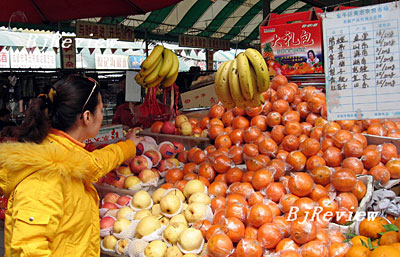|

It's Spring Festival time and with it comes the most brisk consumer spending of the year. Fully aware of this, the Chinese Government is deeply anxious about negative public sentiment over continuous price hikes, launching several policies to stabilize prices in the first half of January. These policies are expected to take the edge off a period when the majority are feeling the pinch in the place where it hurts most-their wallets.
However, whether these policies can really curb the pressure of inflation and regulate the upswing of a rampant consumer price index (CPI) remains to be seen. After all, when the market economy sparkles, price changes are mainly decided by the market itself, and not by government decree.
Firm measures
From January 1, China began to collect a one-year-long provisional export tariff on 57 categories of raw grain and powder products such as wheat and corn. At the same time, China also began to adopt export quota license administration on some grain powder products.
From December 20, 2007, China abolished tax rebates on exports of 84 categories of raw grain and powder products. The additionally collected tariff on these items shows the Chinese Government's intention to use taxation as a means to stabilize domestic grain supply and alleviate the overly rapid increase of consumer prices.
On January 19, Premier Wen Jiabao presided over an executive meeting of the State Council, stipulating temporary price freezes on gasoline, natural gas and electricity, as well as freezes on urban gas, water, heating and public transport charges, and fees for medical treatment will also be stabilized. Prices of major fertilizers, such as carbamide and phosphate fertilizers, will be kept steady too and can in effect only be raised on account of cost increases and after being approved by the regulator.
All these involve people's daily lives and agriculture capital goods. Zhou Maoqing, researcher at the Chinese Academy of Social Sciences (CASS), said stabilizing prices of public utilities and services is beneficiary to tackle social problems caused by inflationary pressure.
On January 14, the State Council held a televised conference in which local government officials throughout the country were instructed to secure market supplies and deploy measures of price regulation with immediate effect.
On January 15, the National Development and Reform Commission (NDRC) began to introduce temporary interventions on the prices of some important commodities and services, requiring 12 companies, such as Ting Hsin International Group and Uni-President China Holding Ltd., two big instant noodle makers, Luhua Group, an edible oil heavyweight, and major dairy firms Yili Industrial Group and Mengniu Dairy, to receive permission from the NDRC before raising prices. In these industries, the output of several large companies takes up a large share of the nationwide market.
Moreover, the People's Bank of China (PBOC), the country's central bank, also accepted suggestions from scholars, speeding up the pace of the yuan's appreciation. Some economists believe that faster yuan appreciation will reduce prices of imported commodities and then curb inflation. The yuan's exchange rate against the U.S. dollar rose from 7.3046 on December 30, 2007, to 7.2418 on January 17, almost creating a record high every other day.
| 